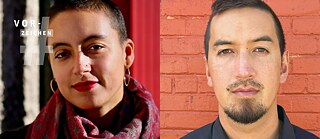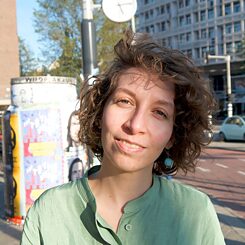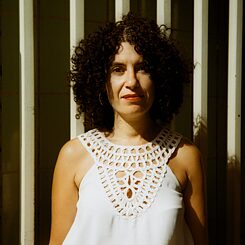Literature//Vorzeichen
Disrupting Translation
‘Disruption’ has become a buzzword: a quality that many institutions and companies have integrated into their corporate branding – including in the literary world. Actual disruption, however, is less likely to be welcomed as warmly. When readers successfully advocated for Amanda Gorman’s poem The Hill We Climb to be translated into Dutch by a Black translator, this decision led to international controversy, not least in the German cultural scene. The debate revealed a fundamental issue of literary scenes in the Global North: expertise is far too often assumed to be white.
In our next event of the series #Vorzeichen, our guests will be Dr Jon Cho-Polizzi and Dr Thalia Ostendorf. In their exchange, they will discuss their experience around translating and publishing contemporary literature in Germany and the Netherlands, at the intersection of scholarship with the literary scene. The event will be co-moderated by Dr Leila Essa (Utrecht University) and Dr Maha El Hissy, the curator of the series. The lecture will be held in English and participation is free of charge.
Dr Jon Cho-Polizzi's research focuses on literary translation, as well as topics of migration, diversity, and trans- and multilingualism in the contemporary German-speaking world. His book project, tentatively titled Resistance, Resilience, Representation: Unmaking the Myths of Post-Wende German Identity traces the role of translation in the intersectional networks of authors, activists, and journalists pushing to reimagine the multidirectional history of Post-Unification Germany. Since 2022, he has been Faculty Coordinator for the Rackham Interdisciplinary Working Group Alamanya: Transnational German Studies and is affiliated with the Department of Comparative Literature at the University of Michigan.
Dr Cho-Polizzi has translated several books including Fatma Aydemir’s Djins, Sharon Dodua Otoo’s Ada’s Room, Max Czollek’s De-Integrate! A Jewish Survival Guide for the 21st Century and the anthology Your Homeland is our Nightmare: An Antifascist Essay Collection co-edited by Fatma Aydemir and Hengameh Yaghoobifarah.
Dr Thalia Ostendorf is a postdoctoral researcher at the University of Amsterdam. She holds a BA and MA in Comparative Literary Studies (research) from Utrecht University and attained her doctorate from the University of St. Andrews in Scotland. She is a co-founder of publishing house Chaos Publishers (Uitgeverij Chaos), now an imprint of Das Mag Publishers. Last year she was one of the translators of Honorée Fanonne Jeffers’ The Love Songs of W.E.B. Du Bois.
Dr Maha El Hissy is an independent literary scholar and critic. In 2024, El Hissy is curating the event series #Vorzeichen [Accidental Portents] for the Goethe-Institut in Northwestern Europe. She is editor of a forthcoming anthology on the art and literature of immigration to post-war Germany with Verbrecher Verlag.
This event is co-funded through the Dutch Research Council (NWO): VI.Veni.211C.012 led by Dr Leila Essa at Utrecht University.
The online events are open to anyone interested in literature and are particularly recommended for German scholars, German culture specialists, students, publishers and translators. In addition to the six online lectures at the interface between literary studies and the publishing industry, the series includes eight conversations with authors plus book reviews that will be published on Instagram over the course of the year. Detailed information about the series as well as event announcements and recordings of events that have already taken place can be found here:
In our next event of the series #Vorzeichen, our guests will be Dr Jon Cho-Polizzi and Dr Thalia Ostendorf. In their exchange, they will discuss their experience around translating and publishing contemporary literature in Germany and the Netherlands, at the intersection of scholarship with the literary scene. The event will be co-moderated by Dr Leila Essa (Utrecht University) and Dr Maha El Hissy, the curator of the series. The lecture will be held in English and participation is free of charge.
Bio
Dr Jon Cho-Polizzi's research focuses on literary translation, as well as topics of migration, diversity, and trans- and multilingualism in the contemporary German-speaking world. His book project, tentatively titled Resistance, Resilience, Representation: Unmaking the Myths of Post-Wende German Identity traces the role of translation in the intersectional networks of authors, activists, and journalists pushing to reimagine the multidirectional history of Post-Unification Germany. Since 2022, he has been Faculty Coordinator for the Rackham Interdisciplinary Working Group Alamanya: Transnational German Studies and is affiliated with the Department of Comparative Literature at the University of Michigan.Dr Cho-Polizzi has translated several books including Fatma Aydemir’s Djins, Sharon Dodua Otoo’s Ada’s Room, Max Czollek’s De-Integrate! A Jewish Survival Guide for the 21st Century and the anthology Your Homeland is our Nightmare: An Antifascist Essay Collection co-edited by Fatma Aydemir and Hengameh Yaghoobifarah.
Dr Thalia Ostendorf is a postdoctoral researcher at the University of Amsterdam. She holds a BA and MA in Comparative Literary Studies (research) from Utrecht University and attained her doctorate from the University of St. Andrews in Scotland. She is a co-founder of publishing house Chaos Publishers (Uitgeverij Chaos), now an imprint of Das Mag Publishers. Last year she was one of the translators of Honorée Fanonne Jeffers’ The Love Songs of W.E.B. Du Bois.
Moderation
Dr Leila Essa is Assistant Professor in Comparative Literature at Utrecht University, where she leads a Dutch Research Council project on authorial strategies against exclusionary discourses in Germany and Britain. Literature and its politics are also at the heart of her public writing and speaking. She is a judge for the Kurt-Tucholsky-Prize for politically engaged German-language writing and one of the authors of the anthology anders bleiben (Rowohlt, 2023).Dr Maha El Hissy is an independent literary scholar and critic. In 2024, El Hissy is curating the event series #Vorzeichen [Accidental Portents] for the Goethe-Institut in Northwestern Europe. She is editor of a forthcoming anthology on the art and literature of immigration to post-war Germany with Verbrecher Verlag.
This event is co-funded through the Dutch Research Council (NWO): VI.Veni.211C.012 led by Dr Leila Essa at Utrecht University.
#Vorzeichen
The lecture is one of six talks by academic and literary experts in the series #Vorzeichen. Whom, What and How we read. The aim of the series is to critique the literary canon by focusing on reading as a means for revealing and dismantling power structures. Texts, forms, aesthetics, discourses, conceptual ideas, and topoi that emerge beyond hegemonic, i.e. dominant, canonisation processes will be examined. In cooperation with an academic institution, the online lectures will feature speakers from various fields, such as academia, publishing and translation, who will discuss the exclusion of texts and authors through canonisation processes and market pressure.The online events are open to anyone interested in literature and are particularly recommended for German scholars, German culture specialists, students, publishers and translators. In addition to the six online lectures at the interface between literary studies and the publishing industry, the series includes eight conversations with authors plus book reviews that will be published on Instagram over the course of the year. Detailed information about the series as well as event announcements and recordings of events that have already taken place can be found here:




